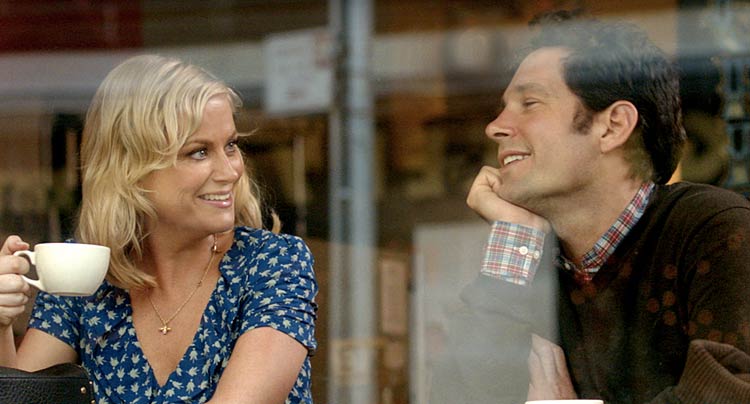
Tries too hard to become a self-aware parody that it forces its humor, generating much less laughs than expected.

Tries too hard to become a self-aware parody that it forces its humor, generating much less laughs than expected.
Writers David Wain and Michael Showalter won over audiences (though not critics) with their 2001 nostalgic summer-camp satire Wet Hot American Summer and attempt to repeat their success with their new rom-com parody They Came Together. The film pokes fun at just about every romantic comedy trope and cliché out there, but committing the same mistakes as the cookie-cutter genre it’s parodying isn’t ironic enough to justify laughs. Many of the punchlines are either beaten to death by repetition or are needlessly explained why they’re funny. And there’s nothing funny about that.
The film begins at a dinner table where Joel (Paul Rudd) and Molly (Amy Poehler) recall how the two of them met to their friends Kyle (Bill Hader) and Karen (Ellie Kemper). Right off the bat the film acknowledges that their story is very much like a corny romantic comedy, as if admitting their own corniness gives the film a free pass. Not long after the lovebirds start describing how they began to date, Kyle blurts out from across the table, “You weren’t kidding, your story really IS like a corny movie!”. Cue the eye rolls.
Both Joel and Molly had broken up with their significant others shortly before running into one other (literally) on their way to the same party. However, it was not love at first sight. The two start off on the wrong foot by getting into a loud argument after blaming the other for the collision. They definitely don’t seem right for each other. After all, Joel works at the Corporate Candy Company which threatens to shut down Molly’s small indie candy shop. Though in the very next scene the two instantly settle their differences in a book store upon discovering their love for the fiction genre. It’s suppose to be ridiculous, that’s the joke.

There are moments where the self-aware comedy works. One of the few laugh out loud moments is when Molly recites a paragraph of specific details while ordering a muffin, only to find out that the entire passage is actually verbatim on the menu. But unfortunately, many of the gags are simply exhausting. Case in point when Joel replies to a bartender, “You can say that again”, who then proceeds to repeat his line over and over until it becomes annoying. A similar instance occurs when someone shouts “swish” after every missed shot on the basketball court. It’s funny maybe once or twice, but definitely not on the fourth or fifth.
They Came Together certainly relies on the undeniable charm of Rudd and Poehler. Maybe a bit too reliant. Both actors do their best with the material, at times elevating the writing better than anyone else could, though even their great comedic chemistry is not enough to save the film. Perhaps that’s why Wain gathers an army of an ensemble including appearances from Ken Marino, Jason Mantzoukas, Ed Helms, Melanie Lynskey, Max Greenfield, Jack McBrayer, Kenan Thompson, and even Judge Judy. These are all welcoming additions but unfortunately all the talent goes to waste with the weak script.
Even a with a short-and-sweet runtime of 83 minutes, They Came Together overstays its welcome with repetitive jokes. The real kicker is many of those jokes weren’t all that great to start with. For example, there is a running joke that New York City plays SUCH an important role in the film that it’s almost a character itself. I suppose this is a dig towards Woody Allen for claiming the city is its own character in his rom-com Manhattan, but I think the joke will mostly fall on deaf ears. They Came Together tries too hard to become a self-aware parody that it forces its humor, generating much less laughs than expected.